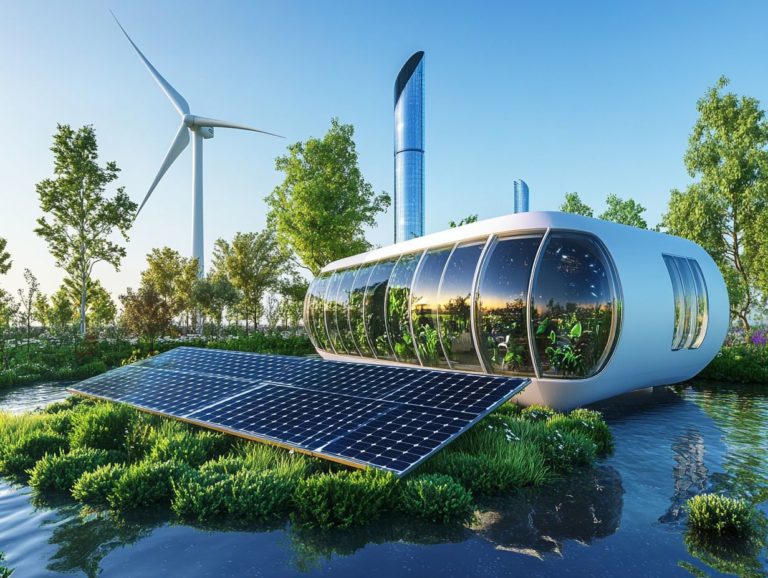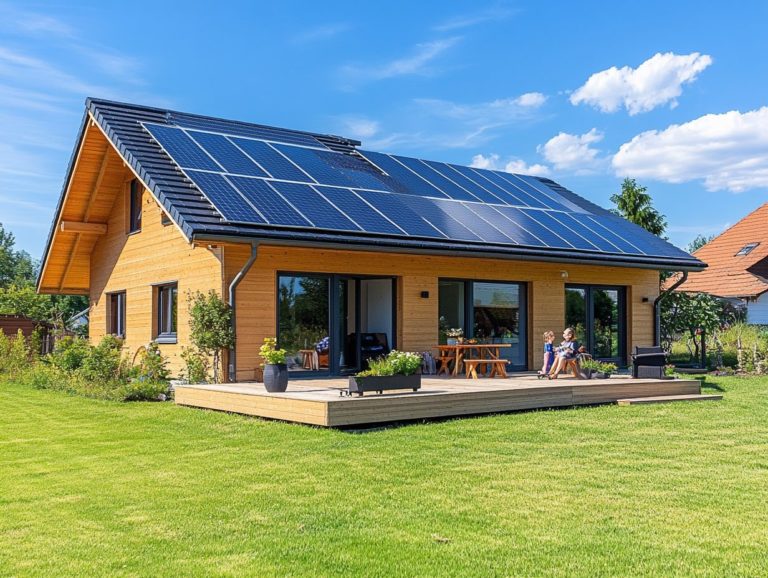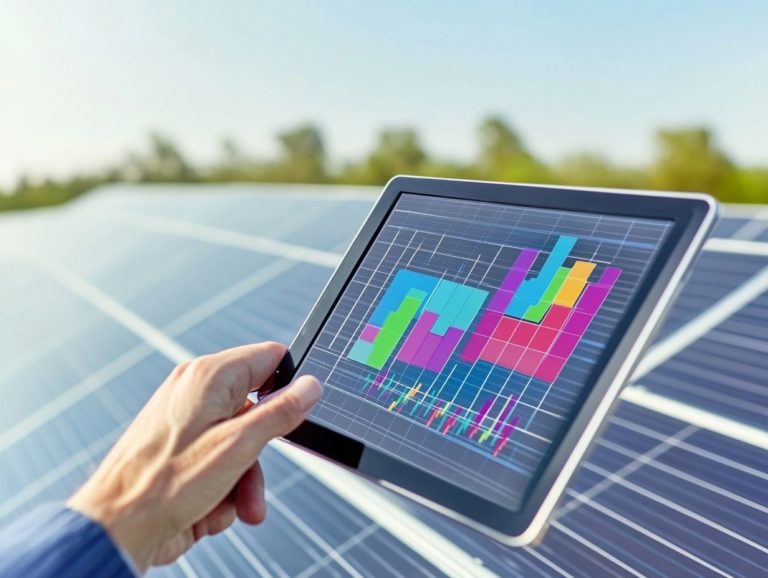“5 Benefits of Solar Energy for Families”
As you consider sustainable living solutions for your family, solar energy emerges as a compelling choice that deserves your attention. It not only promises lower energy costs but also helps take care of the environment while enhancing your home’s value. This article delves into five key benefits of solar energy tailored for families, highlighting tax incentives and the exciting potential for energy independence.
Discover how solar technology works to empower your family! You ll learn about the initial investment and dispel common misconceptions along the way. Embracing solar energy can lead to significant long-term savings and a brighter, greener future for your household.
Contents
Key Takeaways:
- Lower energy costs: Solar energy can cut monthly utility bills.
- Environmentally friendly: It s a clean source that reduces your carbon footprint.
- Increased home value: Solar panels can boost your property’s market price.
1. Lower Energy Costs
Embracing solar energy systems in your home brings the alluring benefit of lower energy costs. You can significantly slash those monthly electricity bills while helping create a sustainable future.
By capturing the sun s power through solar panels and optimizing energy efficiency, you can enjoy substantial savings over time. Solar panels are made of small units that convert sunlight into direct current (DC) electricity. This electricity is then transformed into usable alternating current (AC) for your space.
This clever process not only lessens your reliance on traditional energy sources but also leads to impressive reductions in energy expenses. On average, households that adopt solar systems can save up to $1,500 annually on their electricity bills.
If you enhance your energy efficiency think LED lighting and high-efficiency appliances these savings can soar even higher. By combining solar energy with improved efficiency practices, you can thrive in a sustainable environment while enjoying remarkable long-term financial benefits.
2. Environmentally Friendly
Solar energy is one of the most environmentally friendly energy sources available today. It significantly reduces your reliance on fossil fuels while minimizing harmful emissions that contribute to climate change.
Its renewable nature guarantees a sustainable energy supply. Solar power technologies play a pivotal role in mitigating environmental impact. By harnessing the sun’s power, you can achieve a reduced carbon footprint, leading to cleaner air and healthier ecosystems.
When you install solar panels on your rooftop, you’re not just generating electricity; you’re also conserving natural resources by decreasing the demand for water-intensive energy production methods. Large-scale applications like solar farms present an efficient alternative to traditional energy generation, allowing for the preservation of land and biodiversity.
Transitioning to renewable energy sources like solar is essential for a sustainable future. It decreases greenhouse gas emissions and fosters your energy independence.
3. Increased Home Value
Investing in solar panels can greatly enhance your home’s market value. This attracts environmentally conscious buyers and those who seek energy-efficient features. As more homeowners appreciate the benefits of solar energy systems, properties equipped with this technology are increasingly viewed as valuable assets.
Studies indicate that homes with solar panels can command prices up to 4.1% higher than similar properties without them. This trend shows that more consumers are aware of the long-term savings solar energy offers, from reduced utility bills to potential tax incentives.
A recent report by the National Renewable Energy Laboratory found that around 80% of prospective homebuyers would consider purchasing a home with solar panels, reflecting a positive shift in market perception.
As the adoption of renewable energy continues to rise, real estate trends suggest that properties utilizing solar energy are likely to retain their value more effectively. They may also experience accelerated appreciation rates, making them exceptionally appealing in today’s competitive market.
4. Tax Incentives and Rebates

As a homeowner or business considering solar energy, you can leverage various tax incentives and rebates. These incentives enhance the financial appeal of switching to renewable energy.
At the federal level, you can benefit from the Investment Tax Credit (ITC), which allows you to deduct a significant percentage of your installation costs from your federal taxes, offering immediate financial relief. State and local governments often provide credits and rebates designed to encourage the adoption of renewable energy in your area.
This comprehensive strategy not only reduces your upfront expenses but also paves the way for long-term savings on your utility bills. By lowering the barriers to entry, these financial advantages play a vital role in encouraging more people to embrace solar technology, ultimately supporting environmental sustainability.
5. Energy Independence
Achieving energy independence stands out as one of the most compelling benefits of adopting solar power. By generating your own electricity, you can significantly reduce your reliance on external energy suppliers.
Harnessing renewable energy resources gives you greater control over your energy usage and costs. This transition gives the power to you and fosters a sense of community resilience.
Consider neighborhoods that invest in solar energy systems; they become less vulnerable to the whims of traditional energy markets, which can be swayed by geopolitical tensions or fluctuating fuel prices.
Local governments and organizations are increasingly championing community solar projects. These initiatives allow multiple households to benefit from a shared, larger solar array, bolstering energy autonomy and contributing to local job creation in the renewable energy sector.
Solar power is more than just a sustainable choice it’s your pathway to a more secure and economically stable future.
How Does Solar Energy Work?
Solar energy harnesses the power of sunlight, transforming it into usable energy through a variety of sophisticated technologies, primarily photovoltaic cells and solar thermal systems. Photovoltaic cells are devices that convert sunlight into electricity.
The photovoltaic cells you ll encounter operate on the principle of the photovoltaic effect, where sunlight energizes electrons in semiconductor materials, creating an electric current. Conversely, solar thermal systems concentrate sunlight using mirrors or lenses to generate heat.
This heat can either be used directly for heating applications or converted into electricity through steam turbines. Understanding these distinct methods is essential for anyone whether individuals or businesses looking to embrace sustainable energy solutions.
This understanding reflects the increasing focus on renewable resources and the imperative to reduce carbon footprints in contemporary power generation.
What Are the Different Types of Solar Energy Systems?
There are various types of solar energy systems to consider, each with its distinct advantages and applications. Solar photovoltaic systems convert sunlight into electricity, while solar thermal systems use solar collectors to generate heat.
Among the most popular options, photovoltaic systems feature solar panels that capture sunlight and transform it directly into electrical energy. This makes them particularly suitable for residential and commercial rooftop installations.
Conversely, solar thermal systems typically employ mirrors or lenses to concentrate sunlight, excelling at generating hot water for residential use or powering steam turbines in commercial applications.
Hybrid systems effectively combine the benefits of both technologies, allowing you to harness electricity and heat simultaneously. Choosing the right system can lead to reduced energy bills, lower carbon emissions, and a more sustainable living environment.
What Are the Initial Costs of Installing Solar Panels?
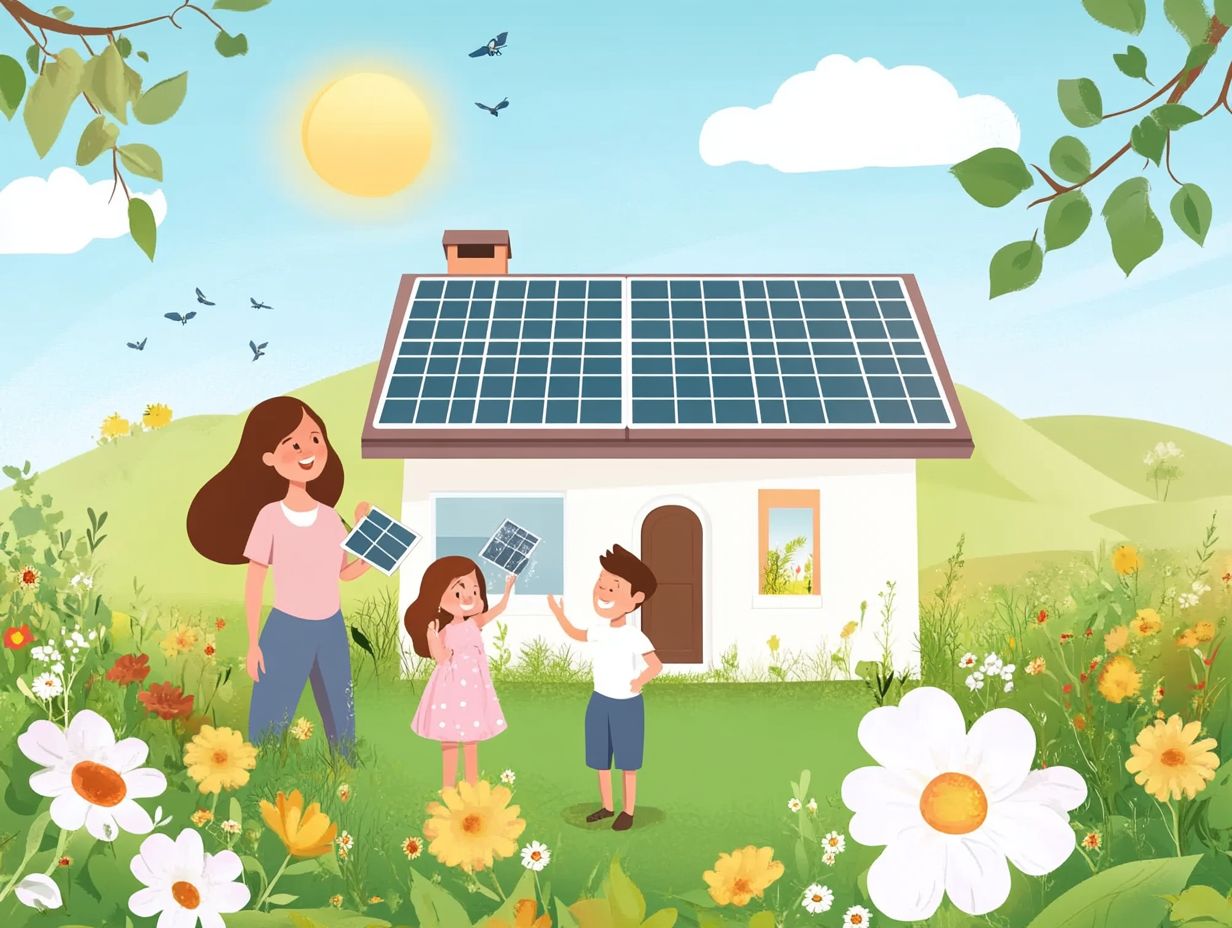
The costs of installing solar panels can vary widely. They depend on factors like system size, installation difficulty, and your location.
The type of equipment you choose and energy efficiency measures can significantly affect your investment. Labor costs also differ based on regional wage standards.
Homeowners should consider potential expenses for added features, like solar energy storage systems. These features can enhance energy independence and maximize savings.
Financing options, such as loans, leases, and power purchase agreements, can ease the initial financial burden. Calculate your expected savings to make a well-informed decision.
How Can Families Benefit from Solar Energy?
Switching to solar energy offers many benefits! You ll enjoy lower energy bills and contribute to a cleaner environment.
These advantages provide immediate financial relief and promote sustainable living. Reducing monthly energy costs frees up funds for other essential needs.
This change decreases reliance on fossil fuels and fosters energy independence. Your community benefits from improved air quality and reduced greenhouse gases.
Investing in solar technology not only lowers utility costs but also leaves a positive legacy for future generations!
What Are the Long-Term Savings of Using Solar Energy?
The long-term savings with solar energy are impressive! Enjoy reduced energy bills and lower maintenance costs over time.
With solar panels lasting 25 to 30 years, your initial investment can pay off significantly. Incentives like tax credits can also help recoup costs faster.
Net metering allows you to sell excess energy back to the grid. Your solar setup can become a reliable source of ongoing financial benefits!
What Are the Common Misconceptions About Solar Energy?
Many misconceptions can prevent you from embracing solar energy. Common myths about high costs and inefficiency cloud the real benefits.
For example, some believe solar panels are too expensive. Recent advancements have made solar more accessible than ever.
Concerns about efficiency are common, but modern panels effectively convert sunlight into energy, even in less-than-ideal weather.
Some doubt the reliability of solar energy, especially at night. Energy storage solutions, like batteries, can store excess energy for later use.
Embracing solar power can lead to significant savings and a smaller environmental footprint. It s a smart choice for many households!
Frequently Asked Questions
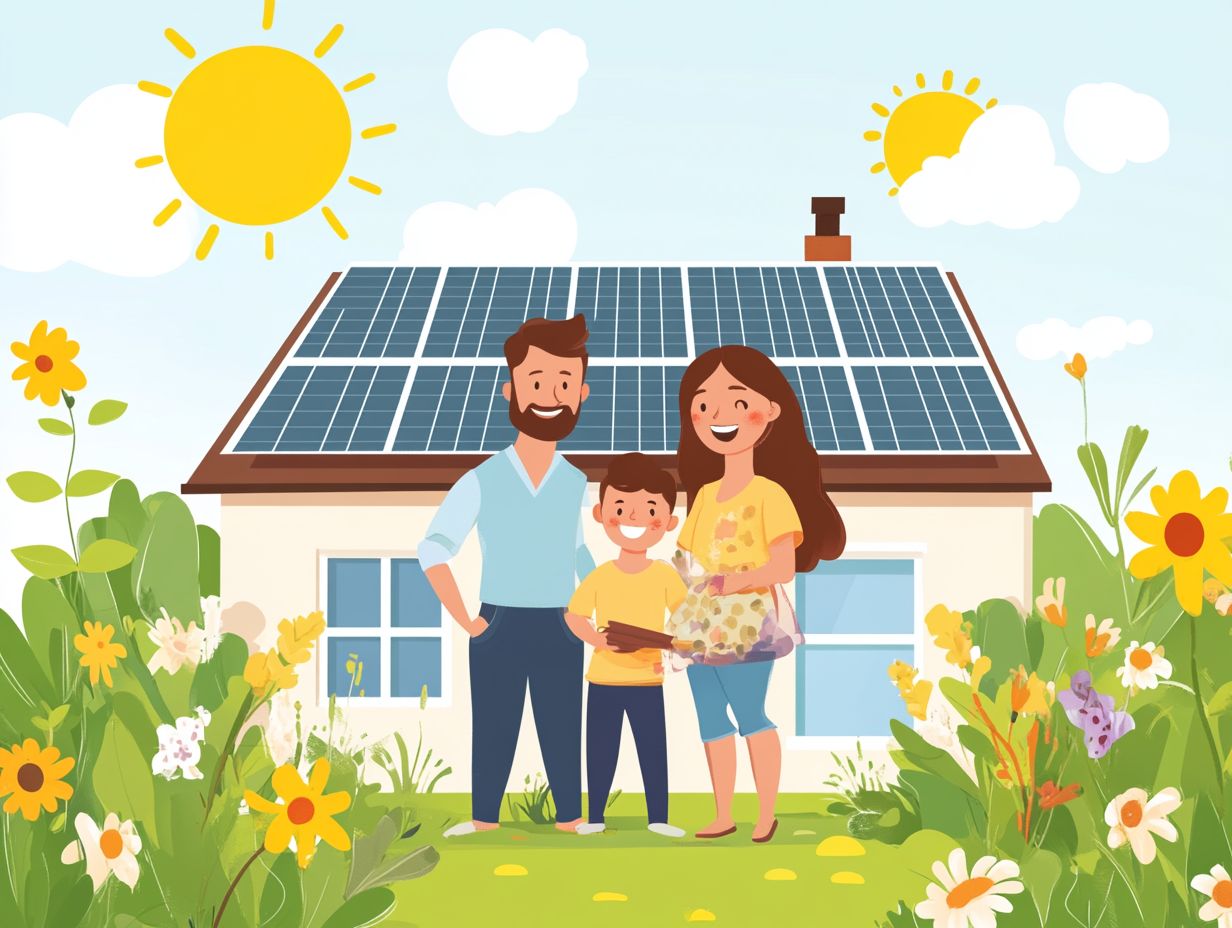
What are the benefits of using solar energy for families?
Using solar energy offers families cost savings, environmental benefits, and energy independence.
How can solar energy help families save money?
Solar energy reduces or eliminates electricity bills. By generating energy from the sun, families can lower their monthly expenses significantly.
Is solar energy good for the environment?
Yes, solar energy is clean and renewable. It doesn’t release harmful emissions like traditional fossil fuels.
Can solar energy provide reliable power?
Absolutely! Today’s solar panels can generate electricity even on cloudy days.
How does solar energy promote energy independence?
Families become less dependent on the electrical grid. This empowers them to take control of their energy use.
Are there tax incentives for using solar energy?
Yes! Families can often find tax incentives and rebates for switching to solar energy. Check local options to see what’s available in your area.

